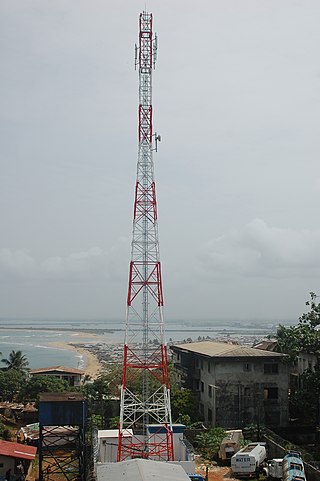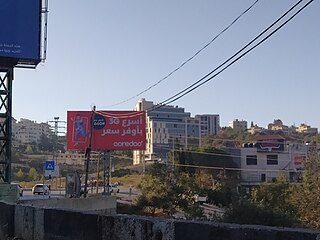Present-day telecommunications in Canada include telephone, radio, television, and internet usage. In the past, telecommunications included telegraphy available through Canadian Pacific and Canadian National.

Communications in Gibraltar comprise a wide range of telephony systems, Internet access, broadcasting and satellite control. There is also printed and online media. Regulation of telecommunications and broadcasting are the responsibility of the Gibraltar Regulatory Authority (GRA), established by means of the Gibraltar Regulatory Authority Act in 2000.

Mass media in Liberia include the press, radio, television, fixed and mobile telephones, and the Internet.
The primary regulator of telecommunications in Malaysia is the Malaysian Communications and Multimedia Commission (MCMC). It issues licenses under the Communications and Multimedia Act 1998, the Postal Services Act 2012 and the Digital Signature Act 1997.
Telecommunications had an early beginning in Mauritius, with the first telephone line installed in 1883, seven years after the invention of the telephone. Over the years, the network and telephony improved. By the late 20th century, the rapid development and convergence of information and telecommunications technologies gave rise to an ICT industry on the island along with many incentives provided by the government. The government thus aims to make the ICT sector the 5th pillar of the Mauritian economy and Mauritius a Cyber Island. Historically, the country is known for tourism, rather than its call centers and business process outsourcing.
Telecommunications in Mongolia face unique challenges. As the least densely populated country in the world, with a significant portion of the population living a nomadic lifestyle, it has been difficult for many traditional information and communication technology (ICT) companies to make headway into Mongolian society. With almost half the population clustered in the capital of Ulaanbaatar, most landline technologies are deployed there. Wireless technologies have had greater success in rural areas.
Telecommunications in Pakistan describes the overall environment for the mobile telecommunications, telephone, and Internet markets in Pakistan.
Telecommunications in the Philippines are well-developed due to the presence of modern infrastructure facilities. The industry was deregulated in 1995 when President Fidel Ramos signed Republic Act No. 7925. This law opened the sector to more private players and improved the provision of telecom services are better and fairer rates, leading to the creation of many telecommunication service providers for mobile, fixed-line, Internet and other services.

Telecommunications infrastructure in South Africa provides modern and efficient service to urban areas, including cellular and internet services. The Independent Communications Authority of South Africa (ICASA) is the watchdog of the telecommunications in the country.
Telecommunications in Tanzania include radio, television, fixed and mobile telephones, and the Internet available in mainland Tanzania and the semiautonomous Zanzibar archipelago.
Modern telecommunications in Thailand began in 1875 with the deployment of the first telegraph service. Historically, the development of telecommunication networks in Thailand were in the hands of the public sector. Government organisations were established to provide telegraph, telephone, radio, and television services, and other government agencies, especially the military, still control a large estate of radio and television spectra. Private telecommunication operators initially acquired concession agreements with state enterprises. For mobile phone services, all the concessions have been amended by successive government to last 25 years have gradually ended in 2015. For other services, the concession terms and conditions vary, ranging from one to fifteen years. Nearly all of the concessions are build-operate-transfer (BTO) contracts. The private investor has to build all the required facilities and transfer them to the state before they can operate or offer services to public.
Telecommunications in the United Kingdom have evolved from the early days of the telegraph to modern broadband and mobile phone networks with Internet services.
Local number portability (LNP) for fixed lines, and full mobile number portability (FMNP) for mobile phone lines, refers to the ability of a "customer of record" of an existing fixed-line or mobile telephone number assigned by a local exchange carrier (LEC) to reassign the number to another carrier, move it to another location, or change the type of service. In most cases, there are limitations to transferability with regards to geography, service area coverage, and technology. Location Portability and Service Portability are not consistently defined or deployed in the telecommunication industry.
PLDT, Inc., formerly known as the Philippine Long Distance Telephone Company, is a Philippine telecommunications, internet and digital service company.

Empresa de Telecomunicaciones de Cuba S.A. is the Cuban state company that provides telephony and communications services in Cuba. It is the sole lawful provider of telephony and telecommunications permitted by the Cuban penal code, constituting a communications state monopoly that has 8 million clients, both national and foreign.

Sure, a trading brand of Batelco, is a telecommunications company in the Isle of Man, Jersey, Guernsey, the Falkland Islands, St. Helena, Ascension Island, and the British Indian Ocean Territory. Sure is the largest tri-island mobile operator across the Channel Islands and Isle of Man.

The State of Palestine has access to Telephone, Radio, Television, and Internet services; however, it significantly trails behind global standards in these sectors. The communications landscape in the Palestinian West Bank and Gaza Strip is hindered by several challenges, including restrictions from the Oslo Accords, which limit the use of spectrum frequencies for wireless communication without Israeli approval. Consequently, this has obstructed the introduction of modern technology into the Palestinian territories.
The Gibraltar telephone numbering plan is the system used for assigning telephone numbers in the British Overseas Territory of Gibraltar. It is regulated by the Gibraltar Regulatory Authority (GRA), which holds responsibility for telecommunications.
Network convergence refers to the provision of telephone, video and data communication services within a single network. In other words, one company provides services for all forms of communication. Network convergence is primarily driven by development of technology and demand. Users are able to access a wider range of services, choose among more service providers. On the other hand, convergence allows service providers to adopt new business models, offer innovative services, and enter new markets.
TelOne Zimbabwe is a parastatal telecommunications company owned by the Zimbabwe government headquartered in Harare's Central Business District. It is the largest telecom entity in Zimbabwe and has the second largest fixed-line network in Southern Africa after Telkom South Africa. The parastatal is Zimbabwe's sole fixed landline services provider.






